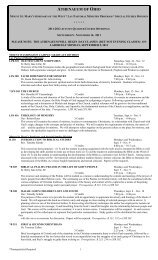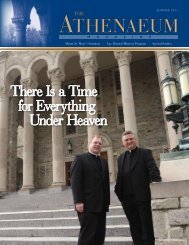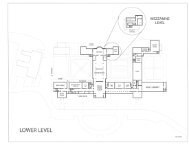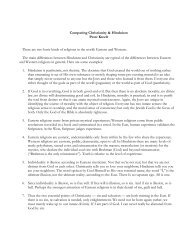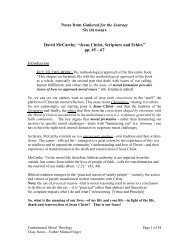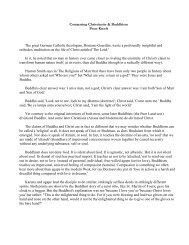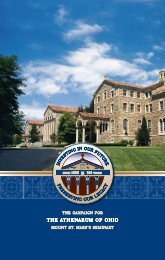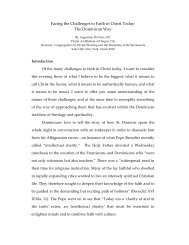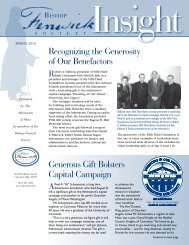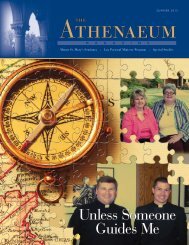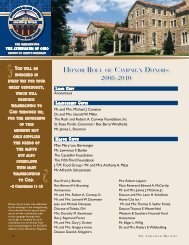2010 Catalog cover - The Athenaeum Of Ohio
2010 Catalog cover - The Athenaeum Of Ohio
2010 Catalog cover - The Athenaeum Of Ohio
- No tags were found...
Create successful ePaper yourself
Turn your PDF publications into a flip-book with our unique Google optimized e-Paper software.
celebrations, so that those responsible for<br />
liturgical preparation might have increased<br />
sensitivity with regard to the contribution of<br />
a particular art form. Presented by<br />
various specialists, the course will<br />
encompass these major areas: music,<br />
liturgical language and hymnody, dance<br />
and movement, architecture, and the<br />
visual arts and environment. Prerequisite:<br />
LS 231 or another introductory course on<br />
worship. (DiCello, 2 Credits)<br />
LS 273 Music Ministry<br />
<strong>The</strong> objective of the course is to pursue<br />
the role and function of music as it relates<br />
to Catholic worship. Through an in-depth<br />
study of the current guidelines on liturgical<br />
music, this course treats a variety of<br />
related topics which include: theology of<br />
music, music and ritual, developing a<br />
philosophy of music ministry, musical roles,<br />
musical forms and repertoire, the role of<br />
the priest in building and supervision of the<br />
parish music ministry program. Prerequisite:<br />
LS 231 or another introductory<br />
course on worship. (DiCello, 2 Credits)<br />
Pastoral and Professional Studies<br />
P 220<br />
Principles of Religious Education<br />
(Also LPP 304)<br />
This course intends to explore the<br />
catechetical mission of the Church in a<br />
pastoral-theological context. Its main<br />
content is derived from pastoral reflection<br />
on central issues of catechesis along with<br />
practical guidelines for responding to them.<br />
<strong>The</strong> student will be asked to be familiar<br />
with at least one of the major documents of<br />
the Church regarding its catechetical<br />
mission in the world. Connected with this<br />
course, and central to it, is a practicum that<br />
includes an immersion in an RCIA<br />
program at a parish in the Archdiocese of<br />
P 230<br />
P 231<br />
Cincinnati. This parish will be chosen by<br />
the Director of Field Education of the<br />
seminary. <strong>The</strong> student is required to<br />
invest at least 30 hours in this practicum,<br />
and it will constitute one credit of this fourcredit<br />
course. <strong>The</strong> student will meet with<br />
the supervisor and the Director of Field<br />
Education and be given a grade for work<br />
in the RCIA program. <strong>The</strong> remaining<br />
three credits will be graded from the class<br />
content by the instructor. (E. Smith, 4<br />
Credits)<br />
Introduction to Canon Law<br />
Systematic introduction to church law, its<br />
history, evolution and practical application<br />
in the life of the church. <strong>The</strong> structure and<br />
content of the 1983 Code of Canon Law<br />
will be examined with a particular focus on<br />
general norms, structures and parish<br />
leadership. (Armstrong, 3 Credits)<br />
Pastoral Counseling<br />
This course equips students with the<br />
fundamental techniques and skills that form<br />
the foundation for all models of counseling.<br />
Students will learn and demonstrate<br />
competence in attending and listening<br />
skills, goal setting, and implementation of<br />
behavioral change plans. Students will<br />
acquire fundamental crisis intervention<br />
skills with situations such as suicide,<br />
domestic violence, divorce and sexual<br />
abuse. This course also introduces<br />
students to the specifically pastoral<br />
dimensions of counseling and explores<br />
appropriate ways to address values,<br />
religion and spirituality with clients. <strong>The</strong><br />
practicum component requires seminary<br />
students to complete additional learning<br />
projects, including taping practice helping<br />
sessions, researching crisis intervention<br />
resources within the community, and<br />
conducting interviews with ordained<br />
ministers and mental health professionals<br />
65



